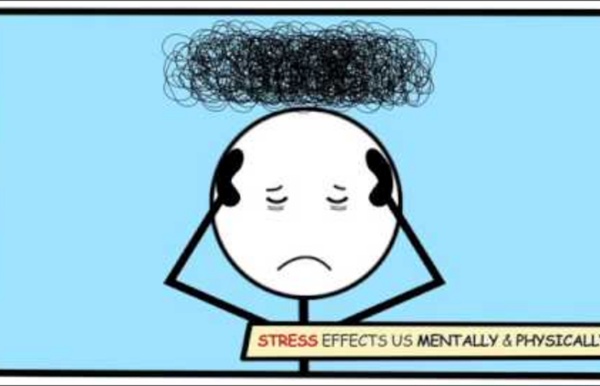



http://www.youtube.com/watch?v=TZZlIKXcolo
Related: Young Teenagers and Stress • Stress in Working AdultsStress symptoms: Effects on your body and behavior Stress symptoms may be affecting your health, even though you might not realize it. You may think illness is to blame for that irritating headache, your frequent insomnia or your decreased productivity at work. But stress may actually be the cause. Common effects of stress Stress Symptoms, Signs, and Causes In today’s fast-paced world, chronic stress is common, but your mind and body can pay a high price. Learn to recognize overwhelming stress—and what you can do about it. What is stress? Stress is your body’s way of responding to any kind of demand or threat. When you sense danger—whether it’s real or imagined—the body’s defenses kick into high gear in a rapid, automatic process known as the “fight-or-flight” reaction or the “stress response.”
Understanding and Managing Stressors Of course, you've heard about stress and may have even experienced a good amount of it already today. But do you know what the difference is between "stress" and "stressors?" Stressors are situations that are experienced as a perceived threat to one’s well-being or position in life, especially if the challenge of dealing with it exceeds a person’s perceived available resources.1 Stress: Symptoms, Causes, and Stress Management Conclusions about the effects of stress Uncontrollable, unpredictable, and constant stress has far-reaching consequences on our physical and mental health. Stress can begin in the womb and recur throughout life. One of the potential pathological (abnormal) consequences of stress is a learned helplessness that leads to the hopelessness and helplessness of clinical depression, but in addition, many illnesses, such as chronic anxiety states, high blood pressure, heart disease, and addictive disorders, to name a few, also seem to be influenced by chronic or overwhelming stress. Nature, however, has provided us with efficient processes (mechanisms) to cope with stressors through the HPA axis and the locus coeruleus/sympathetic nervous system. Furthermore, research has shown us the biological processes that explain what we all intuitively know is is, that too much stress, particularly when we cannot predict it or control its recurrence, is harmful to our health.
High Stress Teens Twice as Likely to Drink or Use Drugs Why do some teens get involved in substance abuse while others do not? What factors or influences increase the risks that adolescents will smoke cigarettes, drink alcohol, get drunk and use illegal and prescription drugs, while others go all the way through high school abstinent? To answer these questions, The National Center on Addiction and Substance Abuse (CASA) at Columbia University conducts a "back-to-school" study otherwise known as "The National Survey of American Attitudes on Substance Abuse." Since 1995, this survey has attempted to identify characteristics, situations, and circumstances that increase or decrease the likelihood of teen substance abuse. From the results of several of CASA's 17 published studies, the following risk factors for increased likelihood that teens will smoke, drink or use drugs have emerged.
42 Worrying Workplace Stress Statistics - The American Institute of Stress Effects of Stress in the Workplace statistics 20. During 2018, 76% of US workers said that workplace stress affected their personal relationships. EFFECTS OF STRESS TO YOUR HEALTH The kids won't stop screaming, your boss has been hounding you because you turned a report in late, and you owe the IRS thousands of dollars you don't have. You're seriously stressed out. Stress is actually a normal part of life. At times, it serves a useful purpose. The biggest cause of stress in America today Money continues to be the leading cause of stress for Americans, a new survey finds. Overall, stress in the United States is at a seven-year low, and average stress levels are declining, the American Psychological Association poll found. But money worries continue to nag at the American psyche, despite the ongoing economic recovery, the association says in its report released Feb. 4, titled Stress in America: Paying With Our Health. Financial worries served as a significant source of stress for 64 percent of adults in 2014, ranking higher than three other major sources of stress: work (60 percent), family responsibilities (47 percent), and health concerns (46 percent).
Stress May Trigger Mental Illness and Depression In Teens - Depression Center - EverydayHealth.com Your teenage years should be among the best times of your life. But the truth is that severe depression in teens is common. Up to 30 percent of adolescents have at least one episode of it, and 50 to 75 percent of adolescents with anxiety, impulse control, and hyperactivity disorders develop them during the teenage years. The effect on troubled teens is far-reaching. Young adults spend more than six hours per day feeling ‘stressed out’, finds Mental Health study Young adults spend more than six hours a day "stressed out", a study has found. A poll of 1,000 18-25-year-olds found money, appearance and career worries as well as fears about the future mean a large chunk of their time is spent feeling anxious or under pressure. But one in 10 feel they have no-one to turn to discuss their concerns, leaving them to face their fears alone. Download the new Independent Premium app Sharing the full story, not just the headlines
What Are the Effects of Cyberbullying? Bullying—including cyberbullying—causes significant emotional, psychological, and physical distress. Just like any other victim of bullying, cyberbullied kids experience anxiety, fear, depression, and low self-esteem. They also may experience physical symptoms, mental health issues, and struggle academically. Here's a closer look at the emotional, mental, and physical effects of cyberbullying. Emotional Effects of Cyberbullying 11 Signs and Symptoms of Too Much Stress Stress is defined as a state of mental or emotional strain caused by adverse circumstances. At one point or another, most people deal with feelings of stress. In fact, one study found that 33% of adults reported experiencing high levels of perceived stress (). The condition is associated with a long list of physical and mental symptoms.